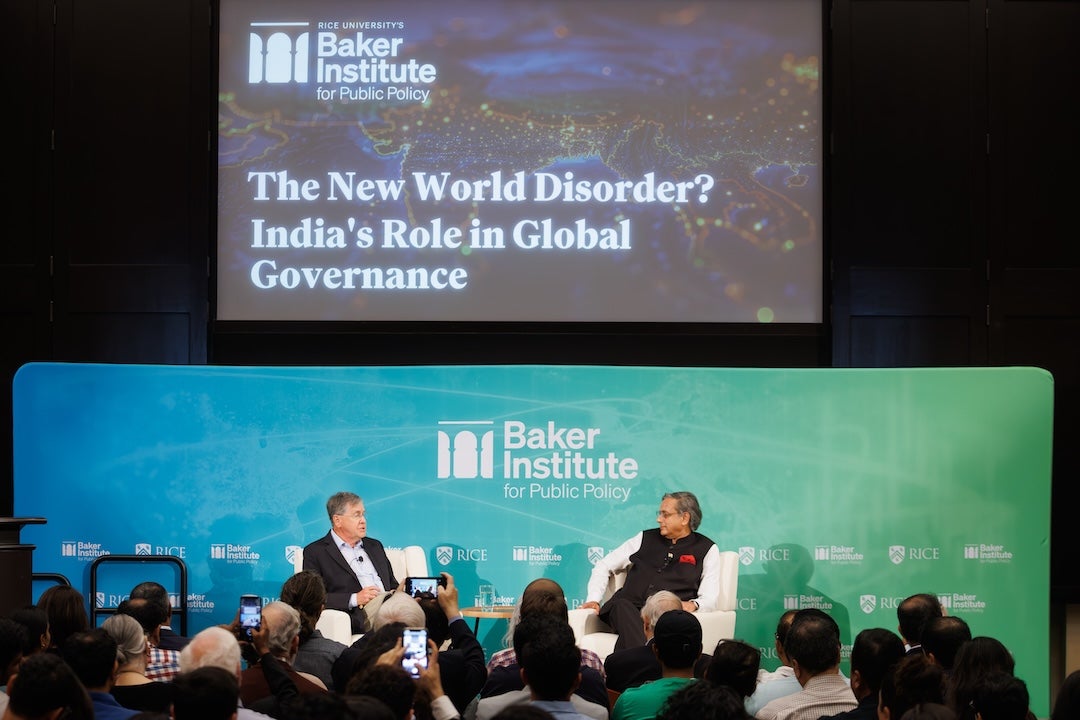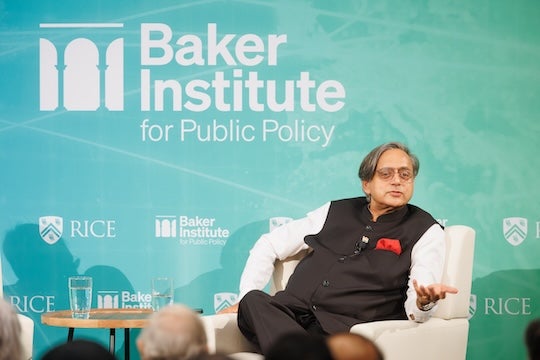Rice University’s Baker Institute for Public Policy welcomed author, politician and former international civil servant Shashi Tharoor Sept. 6 for a deep-dive conversation into how India is positioning itself as a key player on the world stage.
Currently a fourth-term parliament member of Lok Sabha representing the Thiruvananthapuram constituency in Kerala, India, Tharoor previously served as India’s minister of state for human resource development and minister of state for external affairs. During his nearly three-decade career at the United Nations, he served as a peacekeeper, refugee worker and administrator at the highest levels, serving as under-secretary-general during Kofi Annan’s leadership of the organization.

Caroline Levander, vice president for Rice Global and the Carlson Professor in the School of Humanities, opened the event by introducing not only the special guest but the next progression in Rice Global.
“In November, we will be formally opening the Rice Global India Center in Bangalore,” Levander said. “RGI, as it is known, will be the university’s incubator for developing research innovation and advanced educational exchange with diverse industries and academic communities in India. I can think of no one better than Dr. Tharoor to be with Rice as we embark on this momentous endeavor.”

David Satterfield, director of the Baker Institute, Janice and Robert McNair Chair in Public Policy and former U.S. ambassador to Lebanon and Turkey, moderated the conversation with Tharoor. The two diplomats spoke of India, its role in the region, its role in the world today and the country’s future. Satterfield said India’s technology industry development is at a higher point today than it has ever been.
“India matters,” Tharoor said. “I mean, on that there’s no doubt. It’s also already now the world’s most populous country. So what happens to India affects a sixth of humanity, and presumably, as other countries’ population declines and ours keeps growing, it’s going to be a larger percentage of the world population. India also matters because its economy is significant. It’s the world’s fastest growing major economy even today, when China has begun to decelerate a bit, and it is already in purchasing power parity terms the third-largest economy in the world. So India is beyond the stage of either being ignored or taken for granted. It matters anyway. And the choices it makes I think will resonate.”

Tharoor emphasized India’s rapid economic growth, its role in global tech and trade and the complexities of its relations with China, Pakistan and the U.S. He noted India’s energy challenges, its ambitious renewable energy targets and the need for improved infrastructure. Tharoor also addressed domestic political issues, including the rise of Hindu nationalism and its impact on India’s social fabric. The conversation concluded with questions on India’s energy independence, infrastructure development and potential defense cooperation with the U.S.
View the entire conversation here.
This event was co-presented by the Baker Institute, Rice Global and the Chao Center for Asian Studies’ Liu Distinguished Visitor Series.

